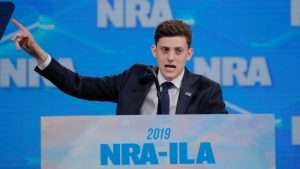
Over the last few days, controversy has raged over whether Harvard University was right to rescind the admission conservative activist Kyle Kashuv after the discovery of racist comments he made in an online Google Doc last year. Unlike almost everyone else who has commented on the issue, I am divided in my own mind on the question of whether Harvard made the right decision. But, wherever I think it’s worth noting that Kashuv became famous in the first place because he was a survivor of the horrific Parkland school shooting, and became an activist on gun rights issues as a result. If not for that history, there probably would be far less controversy over Harvard’s decision. The origin of Kashuv’s fame highlights a troubling aspect of modern political discourse.
In a post written last year, I explained why it’s a mistake to give special credence to the policy views of victims of horrible tragedies. Surviving a school shooting, or some other awful event, doesn’t give you any special insight into the moral and policy questions at stake. Survivors deserve empathy and respect—but not deference to their policy views, except in rare instances where they have genuine expertise on the subject:
[R]ecent gun control protests draw moral authority not only from the age of the protesters, but from the fact that some of their leaders are survivors of school shootings, such as the one in Parkland, Florida that precipitated the current round of protest activity. Even school-age protesters who have not personally experienced gun violence may be seen as having special moral authority, because they are perceived as facing a heightened risk of suffering such horrible events in the future. In reality, school shootings are extraordinarily rare, and schools are among the safest places in American society. Schoolchildren are far more likely to be killed in accidents while walking or riding their bikes to school than in a shooting at school.
But even if students really were disproportionately likely to be victims of gun violence, that would not be a good reason to give special credence to their policy views. Personally experiencing a horrific event or being at disproportionate risk of suffering one, doesn’t necessarily give you special insight into how to prevent such tragedies from occurring. A person who survives an awful plane crash does not thereby gain special insight into aviation safety. Similarly, a person who survives a mass shooting does not thereby get much in the way of useful knowledge of gun policy….
Often, the real reason for focusing attention on victims and survivors is not the value of their insights, but the way in which they tug at our emotional heart-strings. Opposition to policies promoted by survivors of a recent horrific event is easy to denounce as callous and unfeeling. Here, we would do well to remember that our immediate emotional reactions to tragedy are rarely a useful guide to policy. All too often, giving in to such feelings results in policies that create more harm and injustice than they prevent. Liberals are quick to point out this out when it comes to terrorist attacks. Conservatives routinely do so in the aftermath of mass shootings. Both are right, and both would do well to heed each other’s warnings. As with emotional reactions to terrorist attacks, overreactions to the extremely rare phenomenon of school shootings can easily result in dangerous and unjust policies, as with the “zero tolerance” policies enacted in the aftermath of the 1999 Columbine shootings.
In the same post, I also explain why the views of young people on gun control and other policy issues are not entitled to special consideration and deference. Some young people do indeed have valuable contributions to make to policy debates, as is also true of some older people. But youth, as such, should not be viewed as a source of valuable insight.
The post references pro-gun control Parkland survivors, who were in the news at the time (though I also note conservative uses of victims on other issues, such as terrorism and immigration). But the point applies just as readily to Kashuv’s advocacy for the opposing viewpoint.
One caveats to the general rule that survivors’ views on policy issues do not deserve special credence is that survivor testimony is sometimes valuable as proof that a crime or other tragedy actually occurred:
Survivor testimony does have important value in some situations. For example, the testimony of Holocaust survivors and victims of other mass murders provides powerful evidence that those atrocities actually did occur (though there is often other evidence, as well, such as the extensive records kept by the perpetrators of the Holocaust). But the experience of being a Holocaust or Gulag survivor does not, in and of itself, give much insight into how to prevent future Hitlers and Stalins from committing similar atrocities. Similarly, surviving a school shooting does not create expertise on gun control.
Another possible caveat is that, if one side in a policy dispute cites survivor activists as proof that anyone who truly appreciates such a horrific event necessarily supports their position, the other can legitimately cite survivors with opposing views as evidence that that’s not the case. Had conservative gun rights advocates cited Kashuv only for this limited purpose, they would have been on firmer ground.
But these rationales they do not apply in the vast majority of cases where victims are held up as authorities on policy issues, including this one. Even if he had never made any awful racist comments, Kyle Kashuv should not have been held up as a font of wisdom on gun control issues. And the same goes for mass shooting survivors who oppose his position. They deserve our sympathy and understanding—but not our deference to their views.
from Latest – Reason.com http://bit.ly/2L6Depz
via IFTTT